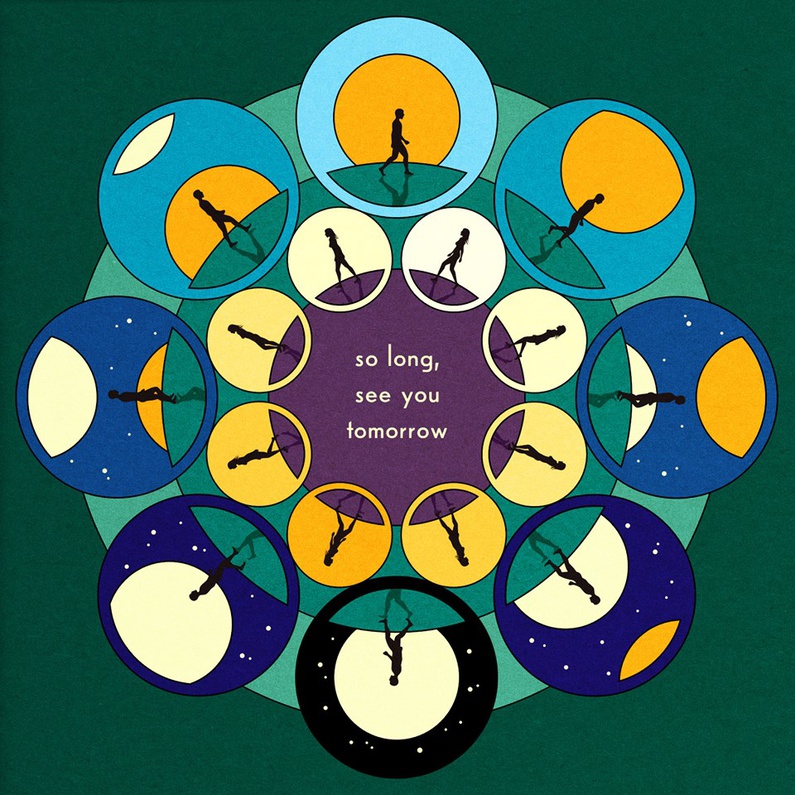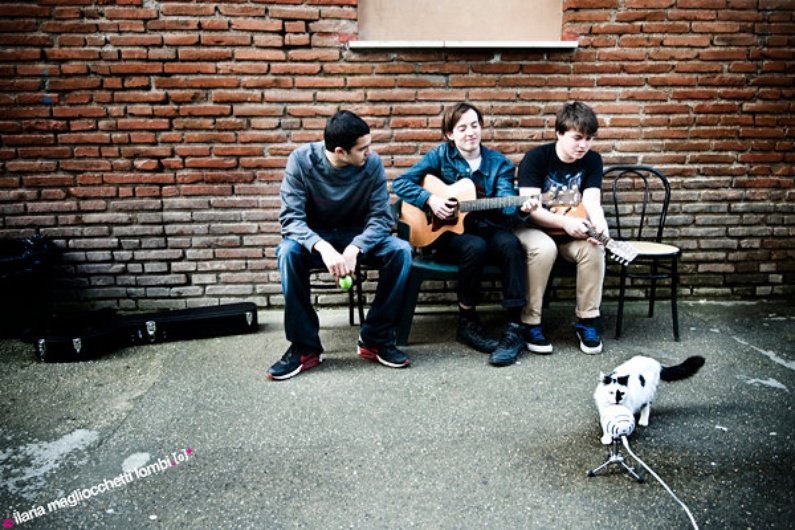
Bombay Bicycle Club: An Interview
Published on
The band from London are buzzing after their fourth album, So Long, See You Tomorrow topped the charts in the UK. Cafébabel spoke to singer-songwriter Jack Steadman about the new album, Bollywood, Eastern influences and tiny rooms in Tokyo.
Arriving at the Trabendo to meet Bombay Bicycle Club, we see Jack Steadman from a distance. He is walking towards us, smiling with his guitar round his neck. He invites us onto his tour bus, offering us beers left over from the night before in Hamburg. Still smiling he says they couldn’t have found an uglier place to stay than the parking lot behind the Trabendo where they have spent the day in Paris. We can only agree. There are mounds of mud and scaffolding strewn everywhere. On tour, this bus is the bedroom and the living space of one of the most successful bands in Britain. Even though the band are all under 25, Bombay Bicycle Club can look back on almost a decade of band history. While talking, Jack, the band’s singer and songwriter, lays his hands on a cushion as if he wants to rest them for the evening gig in Paris.
Café Babel: How's the tour going ?
Jack Steadman: Tours are always up and down. We started in Brussels, we went to Amsterdam, Copenhagen, Hamburg and then we are here in Paris. The shows in Scandinavia were incredible, we never played there before, so the crowd was obviously super excited. And then last night was a bit weird in Hamburg. I got a feeling that German audiences are bigger fans of our older material, which is more heavy and guitar-based, more aggressive and then when we played the new songs with the more Eastern influences and the more light dance-oriented ones, they were just a bit confused.
CB: Is there a different feeling in the cities that you are touring from when you were touring them first of all?
JS: The thing about going back so regularly when you are in a band is it makes you realize how you have changed, because you are doing the same things, whereas a year ago tours were very different for us. We didn’t take them as seriously and we partied the whole time and the shows were sometimes awful and we were hungover. We spent two years producing this record ourselves and we put so much love into it. We go on tour and we want the show to be good now and that is such a different attitude to before where touring was just an excuse to party and have fun.
CB: Do you find it's productive to read the press or do you find it torturous?
JS: It is a terrible idea, but it didn’t stop me from doing it. I am in a really happy place right now, where I just don’t really care. As long as some people like it and we can do our shows, that is fine.
CB: I once saw you in Cambridge and I lost control of my arms and my legs, they just went wild. How would you like people to respond to the music?
JS: I just want people to be smiling the whole time.
CB: What would you say is the message of your music?
JS: I don’t think the music has a message, but as a band we kind of want to be the band, that when you are in the audience you kind of want to be on stage with. We are just kind of normal guys and there is nothing mysterious about us at all. We just look kind of goofy and nerdy on stage and I love that because there is no pretence at all. And if you combine that with the fact that we made the record by ourselves with not a lot of money and it got to number one in the UK that sends a powerful message to people: you don’t need to wear fancy clothes and you don’t need to be a dick head because that is what rockstars do. And you don’t have to spend a lot of money on an expensive producer, you just have to love good music.
CB: Are you into politics at all?
JS: The opposite.
CB: What is the opposite?
JS: I don’t care at all. I don’t pay attention to it.
CB: Was there ever a moment, when you saw politics as some source of creativity for you?
JS: Never. (silence) It is just musical influences, it never has anything to do with something that is happening around me.
CB: What were the key influences when you started to produce music?
JS: It started off with Flea and John Frusciante, I was thirteen and starting to play the bass. He was all about improving and I fell in love with that.
CB: Was there a plan B when you went to school? Or is there something in your head that tells you if this stops today I am going to do something else?
JS: After school I was going to study French at university. I had a place at Manchester. But ever since I've been writing music, I knew this is what I was going to do. So I never thought about any other job. I always had a very strong confidence from a young age that this was going to happen. I don’t know why. I think music is the only thing that I have confidence about.
CB: In a few years time when you’re free, what can you see yourself doing?
JS: I’ve got two plans. One is: I am going to start a jazz café, I don’t know where, but I don’t think it can be in London. But it’s based on these ones that I saw in Tokyo. I visit Tokyo every year and just go record shopping. The shops there are about the size of this room (maybe 10 m2) and there is a man behind the bar and 10,000 records all around and just two big speakers in the corner. You go there and no one talks because you just listen to music. It is like a library and I fell in love with it. I have never seen anything like this outside Tokyo, so I would like to open my own.
After that I would like to become a train driver. I just think it would be a great job. Freedom of mind. I don’t think it will ever happen, because I can’t even drive a car.
CB: Where does the Bollywood music in your record come from?
JS: It comes from a film called Nagin. It’s about a snake charmer. That's the theme music for it. I spent a month in Mumbai. I was just listening to a lot of records and going record shopping. It is taken directly from it. It's just a sample.



